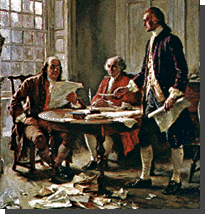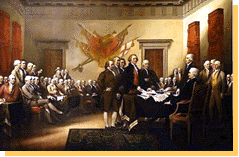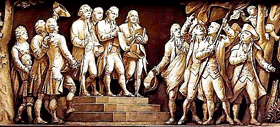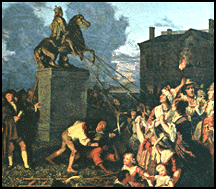

 "I am well aware of the toil and blood and
treasure it will
"I am well aware of the toil and blood and
treasure it will
cost us to maintain this declaration, and support and defend these
states.
Yet through all the gloom I see the rays of ravishing light and
glory.
I can see that the end is worth all the means.
This is our day of deliverance." John Adams

Drafting the Declaration of Independence
The Declaration of Independence, approved by the Continental Congress on July 4, 1776,
is a statement of the principles that 2 days earlier had led Congress
to vote for the independence of the American colonies from Great
Britain. It was designed to influence public opinion, both at
home and abroad, especially in France, to which the United States
looked for military support.
The drafting of the document was entrusted to a committee consisting
of John Adams, Benjamin
Franklin, Thomas Jefferson, Roger
Sherman, and Robert R. Livingston. Because of Jefferson's reputation
as a literary craftsman, the committee assigned the task to him,
and with minor exceptions it is his work. Jefferson drew
upon a long oppositionist tradition in Britain, as well as the
English and French Enlightenments, as sources for his ideas; his
language and the structure of his argument, however, most closely
parallel the natural-rights theories of John Locke. In justifying
England's Glorious Revolution of 1688, Locke had advanced the
contract theory of government, arguing that all "just"
governments are founded on consent and are designed solely to
protect people in their inherent rights to life, liberty, and
property. Radical proponents of this theory had used it to justify
civil disobedience whenever government encroached on any of the
specified rights; the more conservative Jefferson held that resistance
is justified only when a consistent course of policy shows an
unmistakable design to establish tyranny.

Signing the Declaration of Independence
- July 2, 1776
King George III bore the brunt of Jefferson's attack,
although earlier protests had been directed at Parliament and
the governing ministry. This focus was necessary for a contractual
justification of independence, as the colonists had consistently
maintained that their only contract was with the crown.
In one key respect Jefferson used Natural Law instead of natural-rights
theory, substituting "the pursuit of happiness" for
"property" in the trinity of inalienable rights. In
this change, derived from the Swiss legal philosopher Emerich
de Vattel, he emphasized public duty rather than (as the language
seems to indicate) personal choice, for natural law theory is
that happiness is attainable only by diligent cultivation of civic
virtue. Two passages in Jefferson's draft were rejected by the
Congress -- an intemperate reference to the English people and
a scathing denunciation of the slave trade. The document was otherwise
adopted without significant change, and formal signing by 56 members
of Congress began on Aug. 2, 1776.

Reading the Declaration of
Independence
John Adams to Abigail Adams
3 July 1776:
The second day of July, 1776, will be the most memorable
epocha in the history of America. I am apt to believe that it
will be celebrated by succeeding generations as the great anniversary
festival. It ought to be commemorated as the day of deliverance,
by solemn acts of devotion to God Almighty. It ought to be solemnized
with pomp and parade, with shows, games, sports, guns, bells,
bonfires and illuminations, from one end of the continent to the
other, from this time forward, forevermore.
You will think me transported with enthusiasm, but
I am not. I am well aware of the toil, and blood, and treasure,
that it will cost us to maintain this declaration, and support
and defend those States. Yet, through all the gloom, I can see
the rays of ravishing light and glory. I can see that the end
is more than worth all the means, and that posterity will triumph
in that day's transaction, even though we should rue it, which
I trust in God we shall not.*

|
King George crashes down in New York City (right) on the
night of July 9, 1776, after Washington's announcement of independence
to his troops. The gilded lead statue, erected in 1770, showed
His Majesty crowned and mounted on horseback. The mob pulled
down the statue, broke it up, and sent most of the pieces to
Connecticut where munitions makers turned them into 42,000 bullets. |
|

 In Congress, July 4, 1776
THE UNANIMOUS DECLARATION OF THE
THIRTEEN
In Congress, July 4, 1776
THE UNANIMOUS DECLARATION OF THE
THIRTEEN
UNITED STATES OF AMERICA
When in the Course of human events, it becomes necessary
for one people to dissolve the political bands which have connected
them with another, and to assume among the Powers of the earth,
the separate and equal station to which the Laws of Nature and
of Nature's God entitle them, a decent respect to the opinions
of mankind requires that they should declare the causes which
impel them to the separation.
We hold these truths to be self-evident,
that all men are created equal, that they are endowed by their
Creator with certain unalienable Rights, that among these are
Life, Liberty, and the pursuit of Happiness.
That to secure these rights,
Governments are instituted among Men, deriving their just powers
from the consent of the governed.
That whenever any Form of Government becomes destructive
of these ends, it is the Right of the People to alter or to abolish
it, and to institute new Government, laying its foundation on
such principles and organizing its powers in such form, as to
them shall seem most likely to effect their Safety and Happiness.
Prudence, indeed, will dictate that Governments long established
should not be changed for light and transient causes; and accordingly
all experience hath shown, that mankind are more disposed to suffer,
while evils are sufferable, than to right themselves by abolishing
the forms to which they are accustomed. But when a long train
of abuses and usurpations, pursuing invariably the same Object,
evinces a design to reduce them under absolute Despotism, it is
their right, it is their duty, to throw off such Government, and
to provide new Guards for their future security.
Such has been the patient sufferance of these Colonies;
and such is now the necessity which constrains them to alter their
former Systems of Government.
The history of the present King of Great Britain is
a history of repeated injuries and usurpations, all having in
direct object the establishment of an absolute Tyranny over these
States. To prove this, let Facts be submitted to a candid world.
He has refused his Assent to Laws, the most wholesome
and necessary for the public good.
He has forbidden his Governors to pass Laws of immediate
and pressing importance, unless suspended in their operation till
his Assent should be obtained; and when so suspended, he has utterly
neglected to attend to them.
He has refused to pass other Laws for the accommodation
of large districts of people, unless those people would relinquish
the right of Representation in the Legislature, a right inestimable
to them and formidable to tyrants only.
He has called together legislative bodies at places
unusual, uncomfortable, and distant from the depository of their
public Records, for the sole purpose of fatiguing them into compliance
with his measures.
He has dissolved Representative Houses repeatedly,
for opposing with manly firmness his invasions on the rights of
the people.
He has refused for a long time, after such dissolutions,
to cause others to be elected; whereby the Legislative powers,
incapable of Annihilation, have returned to the People at large
for their exercise; the State remaining in the mean time exposed
to all the dangers of invasion from without, and convulsions within.
He has endeavoured to prevent the population of these
States; for that purpose obstructing the Laws of Naturalization
of Foreigners; refusing to pass others to encourage their migrations
hither, and raising the conditions of new Appropriations of Lands.
He has obstructed the Administration of Justice, by
refusing his Assent to Laws for establishing Judiciary powers.
He has made Judges dependent on his Will alone, for
the tenure of their offices, and the amount and payment of their
salaries.
He has erected a multitude of New Offices, and sent
hither swarms of Officers to harass our People, and eat out their
substance.
He has kept among us, in times of peace, Standing Armies
without the Consent of our legislatures.
He has affected to render the Military independent
of and superior to the Civil power. He has combined with
others to subject us to a jurisdiction foreign to our constitution,
and unacknowledged by by our laws; giving his Assent to their
Acts of pretended Legislation For quartering large bodies of armed
troops among us For protecting them, by a mock Trial, from Punishment
for any Murders which they should commit on the Inhabitants of
these States.
For cutting off our Trade with all parts of the world
For imposing Taxes on us without our Consent
For depriving us in many cases, of the benefits of
Trial by Jury
For transporting us beyond Seas to be tried for pretended
offences
For abolishing the free System of English Laws in a
neighbouring Province, establishing therein an Arbitrary government,
and enlarging its Boundaries so as to render it at once an example
and fit instrument for introducing the same absolute rule into
these Colonies
For taking away our Charters, abolishing our most valuable
Laws, and altering fundamentally the Forms of our Governments
For suspending our own Legislatures, and declaring
themselves invested with power to legislate for us in all cases
whatsoever.
He has abdicated Government here, by declaring us out
of his Protection and waging War against us.
He has plundered our seas, ravaged our Coasts, burnt
our towns, and destroyed the Lives of our people.
He is at this time transporting large armies of foreign
mercenaries to complete the works of death, desolation and tyranny,
already begun with circumstances of Cruelty & perfidy scarcely
paralleled in the most barbarous ages, and totally unworthy the
Head of a civilized nation.
He has constrained our fellow Citizens taken Captive
on the high Seas to bear Arms against their Country, to become
the executioners of their friends and Brethren, or to fall themselves
by their Hands.
He has excited domestic insurrections amongst us, and
has endeavoured to bring on the inhabitants of our frontiers,
the merciless Indian Savages, whose known rule of warfare, is
an undistinguished destruction of all aages, sexes and conditions.
In every stage of these Oppressions We have Petitioned
for Redress in the most humble terms: Our repeated Petitions have
been answered only by repeated injury. A Prince, whose character
is thus marked by every act which may define a Tyrant, is unfit
to be the ruler of a free people.
Nor have We been wanting in attention to our British
brethren. We have warned them from time to time of attempts by
their legislature to extend an unwarrantable jurisdiction over
us. We have reminded them of the circumstances of our emigration
and settlement here. We have appealed to their native justice
and magnanimity, and we have conjured them by the ties of our
common kindred to disavow these usurpations, which would inevitably
interrupt our connections and correspondence. They too have been
deaf to the voice of justice and of consanguinity. We must, therefore,
acquiesce in the necessity, which denounces our Separation, and
hold them, as we hold the rest of mankind, Enemies in War, in
Peace Friends.
We, therefore, the Representatives of the United States
of America, in General Congress, Assembled, appealing to the Supreme
Judge of the world for the rectitude of our intentions, do, in
the Name, and by Authority of the good People of these Colonies,
solemnly publish and declare, That these United Colonies are,
and of Right ought to be Free and Independent States; that they
are Absolved from all Allegiance to the British Crown, and that
all political connection between them and the State of Great Britain,
is and ought to be totally dissolved; and that as Free and Independent
States, they have full Power to levy War, conclude Peace, contract
Alliances, establish Commerce, and to do all other Acts and Things
which Independent States may of right do. And for the support
of this Declaration, with a firm reliance on the Protection of
Divine Providence, we mutually pledge to each other our Lives,
our Fortunes and our sacred Honor. JOHN HANCOCK.
New Hampshire
- Josiah Bartlett, Wm. Whipple, Matthew
Thorton.
Massachusetts-Bay - Saml. Adams, John Adams, Robt. Treat Paine, Elbridge
Gerry.
Rhode Island
- Step. Hopkins, William Ellery.
Connecticut
- Roger Sherman, Sam'el Huntington,
Wm. Williams, Oliver Wolcott.
Georgia -
Button Gwinnett, Lyman Hall, Geo. Walton.
Maryland
- Samuel Chase, Wm. Paca, Thos. Stone,
Charles Carroll of Carrolton
Virginia - George
Whthe, Richard Henry Lee, Th. Jefferson, Benja. Harrison, Ths.
Nelson, Jr., Francis Lightfoot Lee, Carter Braxton.
New York - Wm.
Floyd, Phil. Livingston, Frans. Lewis, Lewis Morris.
Pennsylvania - Robt.
Morris, Benjamin Rush, Benja. Franklin, John Morton, Geo. Taylor,
James Wilson, Geo. Ross.
Delaware
- Caesar Rodney, Geo. Read, Tho. M'Kean.
North Carolina - Wm. Hooper, Joseph Hewes, John Penn.
South Carolina
- Edward Rutledge, Thos. Heyward, Junr., Thomas Lynch, Junr.,
Arthur Middleton.
New Jersey - Richd.
Stockton, Jno. Witherspoon, Fras. Hopkinson, John Hart, Abra.
Clark.
(See Bibliography Below)
 ©
©
Author: Forrest McDonald
Picture Credits: Smithsonian Institution (top); The Granger
Collection (middle); New York Historical Society (bottom).
Bibliography: Bailyn, Bernard, The Ideological Origins
of the American Revolution (1967); Becker, Carl L., The
Declaration of Independence (1922; repr. 1958); Dumbauld,
Edward, The Declaration of Independence and What It Means Today
(1950; repr. 1968); Greene, Jack P., ed., The Reinterpretation
of the American Revolution (1968); Laird, A., Profitable
Company: Milestones and Monuments of the Signers of the Declaration
of Independence (1984); Latham, Earl, ed., The Declaration
of Independence and the Constitution, 3d ed. (1976); Wills,
Gary, Inventing America: Jefferson's Declaration of Independence
(1978). *Adams, ed., Works of John Adams, IX, p. 420.
© Copyright "The American Revoulution Home Page" - Ronald
W. McGranahan 1998 - 99 All Rights Reserved